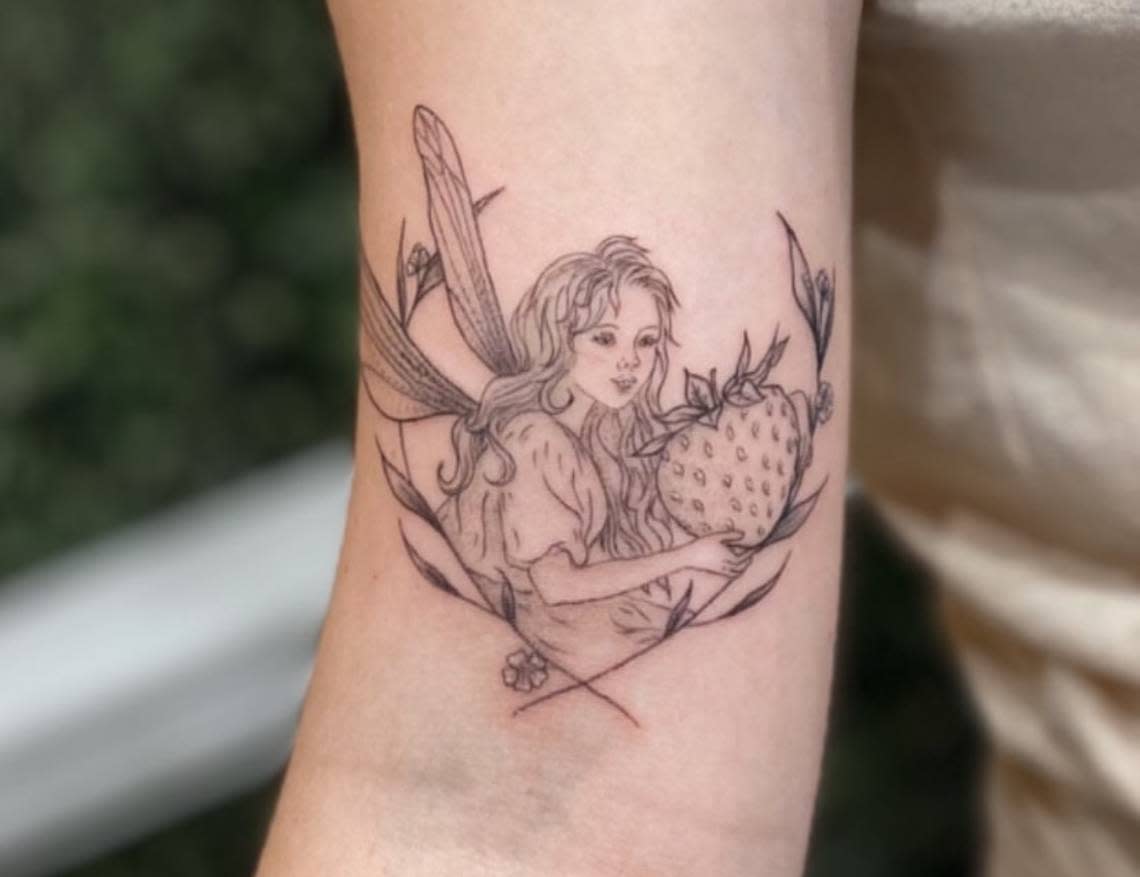Meet the NC tattoo artist changing the industry with florals and dainty things
The phrases “tattoo artist” or “tattoo shop” generally conjure up images of traditional tattoo shops with “flash” pieces (art that can be repeated on anyone’s skin) on the walls, metal music drowning out the sound of the guns pushing ink into bodies by older men whose skin looks like the walls they work within. In these spaces, tattoos feel tough, rebellious, and masculine.
Dax Trail’s studio is not that. She isn’t, either. The 24-year-old’s private studio in a Raleigh business center is covered in plants: faux hedges on the wall, real vines on shelves, and botanical art in frames. On the wall across from the tattoo chair is a flat screen television, so you can put on a movie or show while she decorates your skin. She isn’t heavily tattooed; on social media, she talks about some of the recent additions to her own body and isn’t afraid to say when something (like getting your armpits tattooed) really hurts.
Trail is part of a new wave of tattoo artists working to make the industry a more inclusive space for themselves and others.
One survey found that almost 60 percent of the women polled by the Oxygen network and Lightspeed Research had tattoos, compared to 41 percent of men. In spite of the clientele, the industry can still feel overwhelmingly cisgender, straight, and male, and can be a mixed bag of skill and professionalism thanks to North Carolina’s minimal tattoo regulations. Some artists don’t tattoo darker skintones. Others have been called out for sexual harassment of customers.
“A lot of people are creepy, and will be like, ‘Hey, come after hours to my private studio,’ and it’s just so that they can prey on you or have alone time with you, and that’s scary,” Trail says, specifying that it isn’t just men, and it isn’t just straight people. It’s one of the reasons she lets her customers bring a guest, so they can feel safer.
Other artists, who may not necessarily be racist or misogynist, may give off the impression that any sign of pain during a tattoo is weakness. Trail, whose husband has a rare form of lymphoma, has seen from him how the feeling of getting tattooed can change based on sickness, autoimmune disorders, and more.
I have seven tattoos on my body, including one from Trail. It’s a fairy holding a strawberry on my upper right arm, framed by delicate flowers and stems. It’s inspired by a set of books my grandmother had in her house when I was little. During my tattoo appointment, we watched Sleepy Hollow and she kept checking in to see how I was feeling.

The environment Trail has cultivated matches her art: dainty, thin-line flowers and plants, insects and animals, and all things “cottagecore,” an aesthetic popularized by the social media app TikTok that takes notes from fairy tales and pastoral landscapes. It also is a space designed to meet her own needs.
“I’ve tried guest spotting once or twice at a friend’s place, and just hearing all of the machines going at the same time I’m going, and multiple conversations, and then people every now and then being like ‘Hey, what are you working on?’, my brain goes into overdrive,” Trail says.
Trail realized she had autism around age 18, when she started seeing a therapist. It’s something a lot of people who follow her on social media may not realize, or they respond to it in a way that’s well-intentioned but hurtful. Trail described a message she’d gotten on Instagram the previous day, where a follower told her she shouldn’t keep “masking,” and just be her real self. One of the things that affects her the most, she says, is a type of “burnout” — not because she has overworked herself, but because she’s met her threshold of social interaction.
She doesn’t see autism as a disability, but as a way to explain her tendencies and the way she interacts with the world. In fact, it’s influenced the culture she works to create at her private studio and on her social media accounts. Her openness and reassurance helps people feel comfortable speaking up for themselves, and looking for artists who will treat them well.
“It shouldn’t be like you’re doing the artist a service by letting them mark you forever,” Trail says. “This your thing and your experience. Tattoos are so sacred.”
